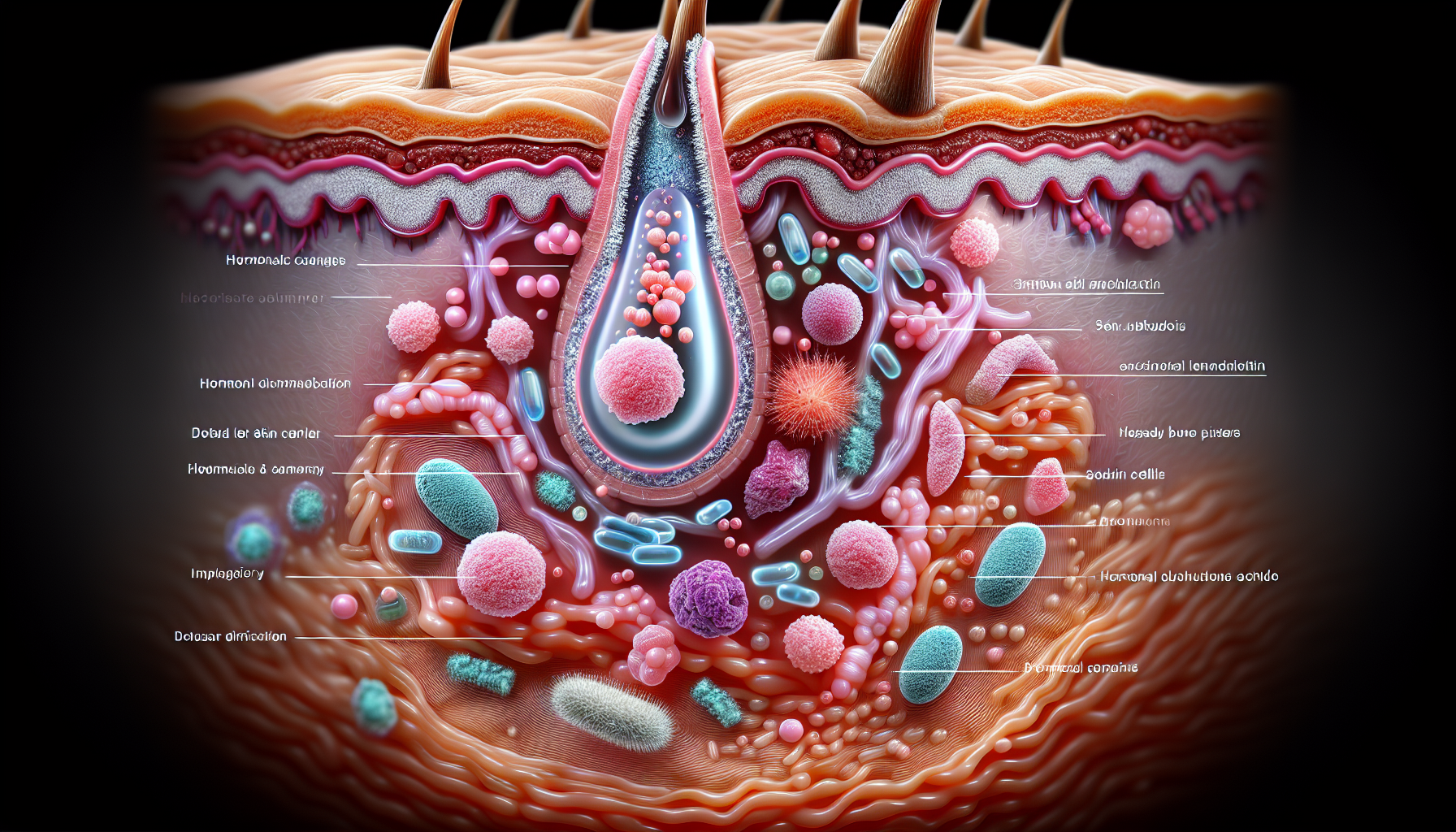Acne, a familiar foe that most of us have battled at some point in our lives. It seems like no matter what we do, those pesky pimples find a way to pop up on our faces, causing frustration and self-consciousness. But have you ever wondered what the main cause of acne actually is? In this article, we will explore the factors that contribute to this common skin condition and uncover the truth behind its origins. So, sit back, relax, and prepare to discover the root causes of acne that you may not have known before.
What is the main cause of acne?
Hormonal changes
Hormonal changes are one of the main causes of acne. During puberty, the body undergoes various hormonal fluctuations, leading to an increase in sebum production. Sebum, an oily substance produced by the skin’s sebaceous glands, can clog pores and result in the formation of acne. Hormonal changes can also occur during menstruation, pregnancy, and menopause, contributing to the development of acne in some individuals.
Excessive sebum production
Excessive sebum production is another significant factor in the development of acne. When the sebaceous glands overproduce sebum, the pores can become easily clogged. This excess oil, combined with dead skin cells, dirt, and bacteria, forms a plug within the hair follicles, leading to the formation of pimples and acne lesions. People with naturally oily skin are more prone to experiencing acne due to their increased sebum production.
Bacterial infections
Bacterial infections, specifically the Propionibacterium acnes bacteria, play a role in the development and progression of acne. These bacteria naturally reside on the skin’s surface, but when excess sebum and dead skin cells accumulate within the hair follicles, they can grow excessively. The presence of these bacteria triggers an inflammatory response in the body, leading to redness, swelling, and the formation of pus-filled pimples.
Genetic factors
Genetics also play a role in the development of acne. Research suggests that if your parents or siblings experienced acne during their lifetime, you may be more prone to developing it as well. Certain genetic variations can influence the function of sebaceous glands, the production of sebum, and the body’s inflammatory response to bacteria. However, it’s important to note that having a familial history of acne does not guarantee that you will develop it, as environmental factors also play a significant role.
Lifestyle and dietary factors
While not the primary cause of acne, lifestyle and dietary factors can contribute to its development or exacerbate existing acne. Poor skincare habits, such as not regularly washing your face or using harsh, irritating products, can disrupt the skin’s natural balance and lead to acne formation. Additionally, consuming a diet high in processed foods, refined sugars, and unhealthy fats may increase inflammation in the body and potentially worsen acne symptoms. It’s essential to maintain a healthy lifestyle and prioritize skincare practices to support overall skin health.
Stress and emotional factors
Stress and emotional factors can also contribute to the development or worsening of acne. During periods of stress, the body produces hormones such as cortisol, which can stimulate the sebaceous glands to produce more oil. Furthermore, stress can disrupt sleep patterns and lead to hormonal imbalances, both of which can contribute to acne formation. Additionally, emotional factors like anxiety and depression can trigger certain behaviors, such as touching your face or picking at acne lesions, which can further aggravate the condition.
Environmental factors
Environmental factors, such as exposure to certain pollutants or chemicals, can also contribute to acne development. For example, air pollution can increase oxidative stress on the skin, leading to inflammation and potential acne formation. Additionally, certain skincare or cosmetic products may contain comedogenic ingredients that can clog pores and promote acne. It’s crucial to be mindful of the environment and products you expose your skin to and make choices that promote its health.
Medications and substances
Some medications and substances can influence the development of acne. Certain medications, such as corticosteroids or contraceptives, can disrupt hormonal balance and trigger acne flare-ups. Additionally, substances like anabolic steroids or certain supplements can increase sebum production or stimulate hormonal changes, leading to acne formation. If you suspect that medication or substance use is contributing to your acne, it’s essential to consult with a healthcare professional for appropriate guidance.
Friction and pressure
Friction and pressure on the skin can contribute to the formation of acne. Wearing tight clothing or using equipment like helmets or backpacks that constantly rub against the skin can lead to the development of acne mechanica. This type of acne is caused by physical irritation and can be further exacerbated when combined with sweat and heat. Taking breaks, wearing breathable clothing, and ensuring proper hygiene can help minimize the impact of friction and pressure on the skin.
Improper skincare routines
Lastly, improper skincare routines can contribute to the development and exacerbation of acne. Using harsh or overly drying products can strip the skin of its natural oils and disrupt its barrier function. This can lead to increased sebum production as the skin tries to compensate for the lack of moisture, ultimately resulting in acne. It’s essential to adopt a gentle and consistent skincare routine, using non-comedogenic products suitable for your skin type.
In conclusion, acne can be caused by various factors, including hormonal changes, excessive sebum production, bacterial infections, genetic predisposition, lifestyle and dietary factors, stress, environmental factors, medications and substances, friction and pressure, and improper skincare routines. Understanding these causes can help you make informed decisions about your skincare and lifestyle choices, promoting healthy and clear skin. Remember, it’s essential to consult with a healthcare professional or dermatologist for personalized advice and treatment options if you are experiencing persistent or severe acne.
